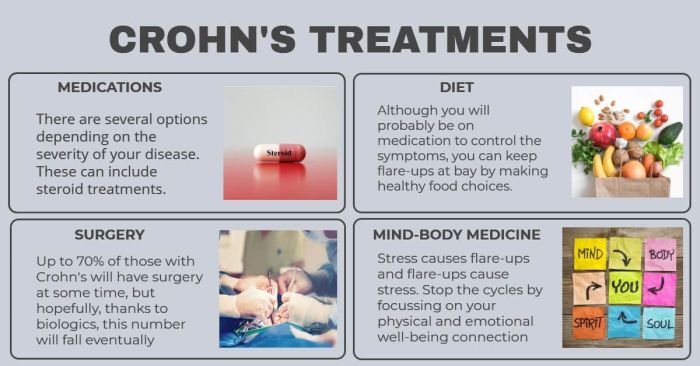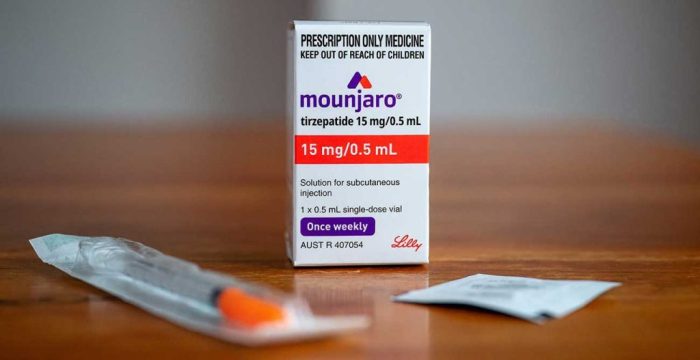Crohns Disease Treatments: Medication vs Lifestyle Changes
Kicking off with Crohn’s Disease Treatments: Medication vs Lifestyle Changes, this opening paragraph is designed to captivate and engage the readers, providing an overview of the topic that delves into the different aspects of managing Crohn’s disease through medication and lifestyle changes.
Exploring the common medications used and the dietary adjustments, stress management techniques, and physical activities that can aid in symptom relief.
Medication for Crohn’s Disease

When it comes to managing Crohn’s disease, medication plays a crucial role in controlling symptoms and reducing inflammation. Different types of medications are used to treat this chronic condition, each working in a specific way to help patients lead better lives.
Common Medications
- Corticosteroids: These medications, such as prednisone, help reduce inflammation in the digestive tract and alleviate symptoms like diarrhea and abdominal pain.
- Immunomodulators: Drugs like azathioprine and methotrexate work by suppressing the immune system's abnormal response, which leads to inflammation in the intestines.
- Biologics: These medications, including infliximab and adalimumab, target specific proteins in the body to reduce inflammation and heal the intestinal lining.
How Medications Work
- Corticosteroids: Corticosteroids mimic the effects of cortisol, a hormone produced by the body, to control inflammation and suppress the immune system's response.
- Immunomodulators: These drugs help regulate the immune system by targeting cells involved in the inflammatory process, thus reducing inflammation in the intestines.
- Biologics: By targeting specific proteins like tumor necrosis factor-alpha (TNF-alpha), biologics help block the inflammation cascade and promote healing in the gut.
Effectiveness of Medications
- Biologics have shown to be highly effective in controlling inflammation and inducing remission in patients with moderate to severe Crohn’s disease.
- Immunomodulators are commonly used as maintenance therapy to prevent flare-ups and keep the disease under control in some patients.
- Corticosteroids are usually prescribed for short-term use due to their potential side effects, and they are not recommended for long-term management of Crohn’s disease.
Lifestyle Changes for Managing Crohn’s Disease
Crohn's disease is a chronic condition that can greatly benefit from certain lifestyle changes. These changes can help alleviate symptoms, reduce flare-ups, and improve overall quality of life for individuals living with the disease.
Dietary Changes
Making smart dietary choices can play a significant role in managing Crohn's disease. Some dietary changes that may help alleviate symptoms include:
- Avoiding trigger foods such as spicy foods, dairy, and high-fiber foods
- Eating smaller, more frequent meals to reduce digestive stress
- Incorporating probiotic-rich foods like yogurt and kefir to promote gut health
- Staying hydrated by drinking plenty of water throughout the day
Stress Management
Stress can trigger flare-ups in individuals with Crohn's disease, making stress management a crucial aspect of treatment. Some strategies for reducing stress and preventing flare-ups include:
- Practicing relaxation techniques such as deep breathing, meditation, or yoga
- Engaging in regular exercise to release endorphins and reduce stress levels
- Seeking support from friends, family, or a therapist to talk about feelings and emotions
- Prioritizing self-care activities that promote relaxation and well-being
Physical Activities
Regular physical activity can have numerous benefits for individuals with Crohn's disease, including improved digestion, reduced inflammation, and increased energy levels. Some examples of physical activities that may benefit individuals with Crohn's disease include:
- Low-impact exercises such as walking, swimming, or cycling
- Yoga or tai chi to improve flexibility, strength, and mental well-being
- Strength training to build muscle and support overall health
- Pilates to improve core strength and stability
Combination of Medication and Lifestyle Changes
When it comes to managing Crohn’s disease, combining medication with lifestyle changes can offer a comprehensive approach to improving overall quality of life.
Benefits of Combining Medication and Lifestyle Modifications
- Medication helps to control inflammation and symptoms, while lifestyle changes such as diet modifications and stress management can further reduce flare-ups and improve overall well-being.
- A holistic approach addresses both the physical and emotional aspects of the disease, leading to a more balanced and sustainable treatment plan.
- Combining medication with lifestyle changes can enhance the effectiveness of each individual treatment method, providing a synergistic effect that can lead to better outcomes.
Improving Quality of Life with a Holistic Approach
- By incorporating both medication and lifestyle modifications, individuals with Crohn’s disease can experience fewer symptoms, reduced disease activity, and an improved overall quality of life.
- Healthy habits such as regular exercise, adequate sleep, and stress reduction techniques can complement the effects of medication, leading to better disease management and a higher quality of life.
- Patients who adopt a holistic approach often report feeling more in control of their condition, experiencing fewer complications, and enjoying a better sense of well-being.
Success Stories of Individuals Finding Relief
- Many individuals with Crohn’s disease have shared their success stories of finding relief through a combination of medication and lifestyle changes.
- From managing symptoms more effectively to achieving remission and improving overall health, these success stories highlight the importance of a comprehensive treatment approach.
- By following a personalized treatment plan that includes both medication and lifestyle modifications, individuals can regain control over their health and live a fulfilling life despite the challenges of Crohn’s disease.
Challenges and Considerations
When individuals are managing Crohn's disease, they may encounter various challenges in balancing medication and lifestyle changes. It is crucial to address these challenges effectively to ensure optimal management of the condition.
Potential Challenges in Balancing Medication and Lifestyle Changes
- Adherence to medication schedules while incorporating lifestyle changes such as diet modifications and exercise routines.
- Side effects of medications that may impact the individual's ability to follow certain lifestyle changes.
- Finding the right balance between medication efficacy and the impact of lifestyle changes on symptoms.
Importance of Regular Monitoring and Communication with Healthcare Providers
Regular monitoring and open communication with healthcare providers play a significant role in managing Crohn's disease effectively. It allows for adjustments in medication dosages, evaluation of lifestyle changes, and overall assessment of the disease progression.
Misconceptions and Myths Surrounding Medication vs Lifestyle Changes
-
Myth:
Medication is the sole solution for managing Crohn's disease, and lifestyle changes are not necessary.
-
Myth:
Lifestyle changes alone can cure Crohn's disease without the need for medication.
-
Misconception:
Medication will completely eliminate symptoms, making lifestyle changes unnecessary.
Closure
In conclusion, this discussion has shed light on the importance of a holistic approach in treating Crohn’s disease, emphasizing the benefits of combining medication with lifestyle modifications for improved quality of life.
FAQ Guide
What are the potential challenges of balancing medication and lifestyle changes for Crohn’s disease?
Balancing medication and lifestyle changes can be challenging due to the need for consistent adherence to both aspects, potential side effects of medications, and the discipline required to maintain dietary and stress management routines. Regular monitoring and communication with healthcare providers are essential.
Can individuals with Crohn’s disease find relief solely through lifestyle changes without medication?
While lifestyle changes can play a significant role in managing Crohn’s disease symptoms, some individuals may require medication to effectively control inflammation and prevent flare-ups. It's important to work closely with healthcare providers to determine the best treatment plan.
Are there any misconceptions about the effectiveness of medication versus lifestyle changes for Crohn’s disease?
One common misconception is that medication alone can fully manage Crohn’s disease without the need for lifestyle changes. In reality, a combination of both approaches often yields the best results in terms of symptom control and overall well-being.




